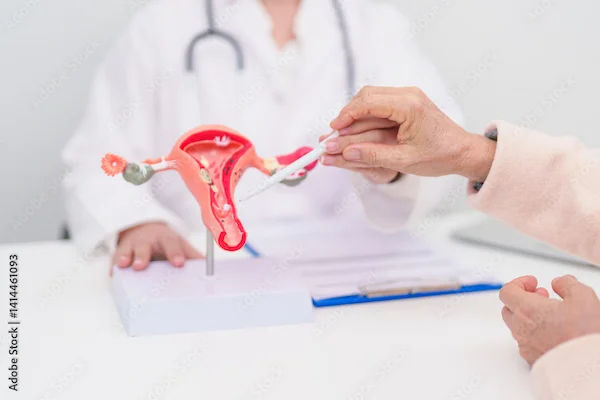Permanent Solutions for PCOS Management
Know about PCOS management, common symptoms, strategies for PCOS treatment and when to see a doctor and more.

Written by Dr. Mohammed Kamran
Reviewed by Dr. Shaik Abdul Kalam MD (Physician)
Last updated on 12th Aug, 2025

Introduction
Polycystic Ovary Syndrome (PCOS) is a common hormonal disorder affecting women of reproductive age. While there is no permanent cure for PCOS, it can be effectively managed with lifestyle changes, medical treatments, and consistent care. If you're struggling with PCOS, know that you're not alone. Many women successfully manage their symptoms and lead healthy, fulfilling lives.
This article will guide you through long-term solutions to control PCOS symptoms, improve hormonal balance, and enhance overall well-being.
Understanding PCOS: What Happens in Your Body?
PCOS is a hormonal imbalance where the ovaries produce excess androgens (male hormones), leading to irregular periods, ovarian cysts, and other symptoms. The exact cause is unknown, but insulin resistance, genetics, and inflammation play a role.
Consult a top gynaecology specialist for the best advice
Common Symptoms of PCOS
The common PCOS symptoms include:
Irregular or missed periods
Excessive facial or body hair (hirsutism)
Acne and oily skin
Weight gain (especially around the abdomen)
Hair thinning or male-pattern baldness
Difficulty getting pregnant
Dark patches on the skin (acanthosis nigricans)
If left untreated, PCOS can increase the risk of type 2 diabetes, heart disease, and infertility.
Permanent Management Strategies for PCOS
Since PCOS is a lifelong condition, the goal is to control symptoms and prevent complications through sustainable lifestyle changes and medical support.
1. Dietary Changes for Hormonal Balance
What you eat plays a crucial role in managing PCOS. Focus on:
Low-Glycemic Index (GI) Foods – Helps control blood sugar levels.
Whole grains like oats, quinoa, brown rice.
Legumes like lentils and chickpeas.
Non-starchy vegetables like leafy greens and broccoli.
Healthy Fats – Supports hormone production.
Avocados, nuts, seeds, olive oil
Lean Proteins – Keeps you full and stabilizes insulin.
Eggs, fish, chicken, tofu
Avoid sugary foods, refined carbs (white bread, pastries), and processed snacks.
2. Regular Exercise for Insulin Sensitivity
Physical activity helps lower insulin resistance and manage weight. Aim for:
30 minutes of moderate exercise (walking, cycling, yoga) daily
Strength training (twice a week) to build muscle and improve metabolism
3. Weight Management (If Needed)
Even a 5-10% weight loss can significantly improve PCOS symptoms by regulating hormones and menstrual cycles.
4. Stress Reduction & Sleep Hygiene
Chronic stress worsens PCOS by increasing cortisol (stress hormone). Try:
Mindfulness & meditation
7-8 hours of quality sleep nightly
Relaxation techniques (deep breathing, yoga)
5. Medical Treatments (If Required)
Depending on symptoms, doctors may recommend:
Birth control pills (to regulate periods & reduce androgen levels)
Metformin (improves insulin sensitivity)
Fertility treatments (if trying to conceive)
Anti-androgen medications (for acne & excess hair)
6. Natural Supplements (Consult a Doctor First)
Some supplements may help, including:
Inositol (improves insulin sensitivity)
Omega-3 fatty acids (reduces inflammation)
Vitamin D (many women with PCOS are deficient)
Can PCOS Be Cured Permanently?
Currently, there is no permanent cure for PCOS, but consistent management can keep symptoms under control. Many women see significant improvement by following a healthy lifestyle and medical advice.
When to See a Doctor?
If you experience:
Irregular periods for over 3 months
Severe acne or excessive hair growth
Difficulty losing weight despite diet & exercise
Trouble conceiving
Final Thoughts
PCOS is manageable with the right approach—diet, exercise, stress control, and medical support can make a huge difference. Stay patient, stay consistent, and remember that small changes lead to big improvements over time.
Consult a top gynaecology specialist for the best advice
Consult a top gynaecology specialist for the best advice

Dr. Jasmine Sarah Abraham
Obstetrician and Gynaecologist
14 Years • MBBS, MS (Obstetrics & Gynaecology), MRCOG (Obstetrics & Gynaecology) (Fellowship in Minimal Invasive Surgery (Gynaecology)
Bengaluru
Unicorn Multi-Speciality Clinic, Bengaluru

Dr. Ritika Khurana
Obstetrician and Gynaecologist
16 Years • MBBS, DGO(GYNAECOLOGY AND OBSTETRICS)
Pune
Dr Rupali and Dr Ritika, Pune

Dr. Amodita Ahuja
Obstetrician and Gynaecologist
10 Years • MBBS, DGO, DNB (Obstetrics & Gynaecology)
New Delhi
AAKASH MEDSQUARE, New Delhi

Dr Homeira Nishat
Obstetrician and Gynaecologist
34 Years • MBBS, Diploma in Obstetrics & Gynaecology
Bengaluru
Cure Hospital and Clinic, Bengaluru

Dr. Debashree Saha
Obstetrician and Gynaecologist
4 Years • MBBS, MS (Obstetrics & Gynaecology)
Kolkata
DR. DEBASHREE SAHA Clinic, Kolkata

